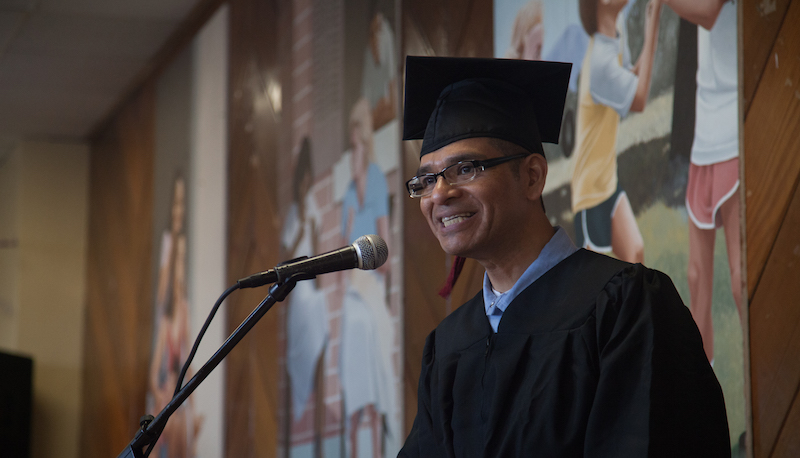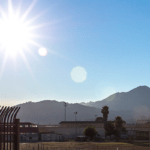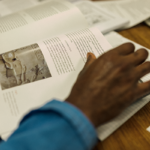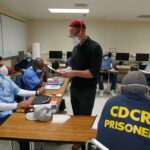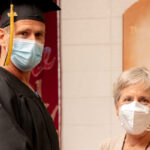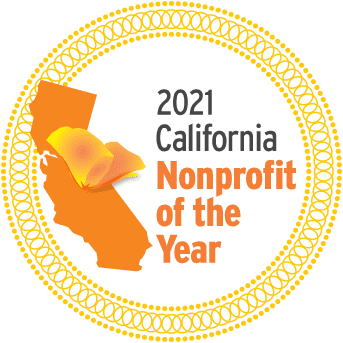On June 9th, we celebrated with friends, family, and teachers in the San Quentin Visiting Room as fourteen Prison University Project students received their Associate Degrees. We’re pleased to share the valedictory address by Angelo F.
Good morning! Welcome to the 2017 Commencement Exercises of Patten University at San Quentin! My name is Angelo, and I have been a student at an institution of higher learning at—of all places—San Quentin. Organized by the Prison University Project, Patten U. at San Quentin is one of the most innovative centers of education in the State correctional system.
But before I begin, there are some people who must be acknowledged for their support of this program. I want to thank Warden Ron Davis and the San Quentin administration, all of the support groups, staff sponsors, and group volunteers. All of you helped create the programming culture of San Quentin.
I want to thank the people of the State of California for the times they voted in favor of prison reform these past six years, including Prop. 57. Yes, prison reform—a topic I’m surprised people suddenly care about! That’s California and reform. It’s what we do best…which once in awhile we do.
I am also grateful to my former supervisors at Centerforce, the Executive Director of the Prison to Employment Connection, the directors of Marin Shakespeare, my brothers in Code.7330, and the Last Mile, for their positive encouragement and ongoing support.
And a heartfelt thanks to our families! Welcome! Know in your hearts that your love keeps us going. You are very important to us. Thank you for being here.
Finally, this program would not be this successful if not for all of the volunteer college instructors, and their hard work and tireless dedication. You have changed our lives in more ways that I can describe. On this college campus, the instructors care more about our success than about our past failures. We succeed because our classrooms are without condemnation, without humiliation. Thank you for not judging us. Thank you for not judging me. Also, many thanks to the program coordinators, the program directors, and clerk staff.
And of course, we are all thankful for the leadership of Executive Director, Dr. Jody Lewen. She is incredibly dedicated to this program. From greeting new students—like the shy and nervous ones—to encouraging returning students. From recruiting graduate students and professors from Bay Area universities, to supporting events like the Day of Peace. Whether in hot or cold weather, or drenched from the rain, she sponsors symposiums and brings in speakers. She does what she can to make sure that we have every opportunity to receive the best education. Ladies and gentlemen—wouldn’t you agree? —these amazing humanitarians deserve a standing ovation!
Under Jody Lewen’s leadership, the Prison University Project continues to offer incarcerated men a quality college education, thereby providing a proactive solution to a severe and expensive public issue in California: recidivism, or the subsequent arrest of formerly incarcerated individuals. The reduction of recidivism saves taxpayers millions of dollars every year in costs related to re-arrest, court appearances, public defender and prosecutor fees, local and state re-incarceration, along with healthcare and subsequent parole supervision costs. Too much of a burden on California taxpayers. Friends, California and this nation are in better shape, thanks to the Prison University Project.
Today, I am proud and honored to be graduating with a class of accomplished and distinguished individuals. In the worst of circumstances, they engaged in the greatest of achievements. It’s no secret that many Patten students are in positions of leadership here at San Quentin. In support groups, adult education, vocations, and in the arts. They are the difference makers who are tearing down the walls of ignorance and setting a new standard. They are the facilitators, teacher’s assistants, clerks, actors, writers, tutors, and journalists. They chair the executive committees of various self-help programs, and some sit on the Warden’s Advisory Council.
In collaboration with outside health agencies and San Quentin medical staff, they put on events like the San Quentin Health Fair, one of the biggest health fairs behind prison walls in the nation. They are mentors to Youth Offenders; they are the Brother’s Keepers who support those on the brink of crisis; they are the addiction recovery counselors who help men stay sober; and they are the certified domestic abuse counselors who help men learn how to make amends. Ladies and gentlemen, these men are history makers, the vanguards of restoration through education. It is truly a privilege to graduate with you.
My fellow graduates, there is an even brighter future ahead of you. I am confident that you will continue—on a greater scale—to do good for your communities. Mark my words: after release, you will continue to touch the lives of many people. In addition to all of the good that you have done, I guarantee that at least one of you will warm a mother’s heart, bring joy to the life of a child, will change your communities for the better, and save someone’s life. I know it.
I know that times were often tough in here. Some of us went through more than others. For some of us, our choices led us here. Sometimes, dysfunction and immediate gratification influenced those choices. For others, our circumstances made us vulnerable to persecution. But history shows that for every setback, there is a comeback. I’ve heard that in the free world, the odds will be against us. But we can make it our excuse, or make it our purpose. Being in here did not defeat us; it inspired us. Our challenges worked for us.
In society, some might believe that you cannot be trusted. Their fear is often fueled by stereotype or alternative facts. Just keep in mind: those individuals do not determine your potential, your resiliency, or your strength. And remember this day. Cherish this exciting chapter in the book of you. The energy of this graduation: hold onto it and always keep a pure heart, and you will develop a peace that goes beyond understanding.
Ladies and gentlemen, today is no ordinary day. Those who truly know me know that education is my paramount pursuit. Today is a dream come true. Earning a degree brings me the greatest satisfaction and the greatest joy. More joy than when I received my first bike or my first job. More joy than buying that first home. Maybe more than winning the lottery or dating Rihanna…well maybe as much joy as dating Rihanna, but definitely a joyous occasion.
My love of education and innovation was inspired by my dad. A former Army Lieutenant and electromagnetic engineer, he encouraged me to think big. That’s why I have always lived with ridiculously high hopes. I have often taken the high road. Always aiming high. Higher and higher. When people see me, they say, “Yeah, that’s Angel. He’s high.” I recall that on the eve of my thirteenth birthday, about a month before—still twelve—I had a rare heated argument with my parents. I had stood up to their insistence that I study to be a heart surgeon. I told them that I wanted to own a taxi company, instead. My taxi company would offer the best customer service: clean, comfortable vehicles, with Cerwin Vega sound systems, complementary beverages and satellite TV. If allowed to pursue this dream, I promised to take care of my parents, help the poor, and invest in space travel. That’s right, space travel. I wanted to build a ship like the U.S.S. Enterprise and launch it into space. Hey, if you don’t innovate, you evaporate.
Then dad asked what I wanted for my birthday. I wanted what my dad used as an engineer: a scientific calculator. He gave me one, with all those cool buttons that I didn’t know how to use. But he gave me an even greater gift with his words. He wrote on the birthday card, “Hijo, el futuro está en la escuela. El futuro es la educación. Sigue me concejo y verás que serás dueño del mundo.” For all our guests who are bilingually impaired, my dad wrote, “Son, the future is at school. The future is education. Heed my advice; and you shall own the world.”
In addition to high pursuits, my parents also taught us the value of hard work, of choices and consequences…I probably should have paid more attention to that last one! In our home, my parents always said: “What is forced is not good. A la fuerza, nada es bueno.” That’s right mom, I still remember. In other words, a person cannot be forced to be a good person, forced to be kind, forced to be honest, or forced to love something or someone. These things must occur naturally and voluntarily.
Growing up, I remember weekends during the holiday season were hard. Not because we were poor, but because my parents would put us all to work. Every year, we volunteered at our church’s soup kitchen and at the food bank. Working at the food bank was brutal. We would spend the Thanksgiving and Christmas holiday weekends packing food and meals for low income families. Every year, several dozen families volunteered to pack frozen turkeys, hams, vegetables, bread, and canned food into hundreds of boxes and paper bags. This, my parents would say, was our obligation to our community. I remember one year, I tried to get out of going. I was twelve—my year of rebellion—and I chose to stay in bed. I remember I was a healthy kid. I weighed about 100 pounds…I’ll come back to that.
Some of you have already met my mom and many of you have seen and met her in Visiting. She’s a sweet lady. A retired floral designer, so soft-spoken and nice. She walks with a cane. Don’t let any of that fool you. All that stuff about arthritis…she was a strong Peruvian woman. That one time when I was twelve, mom lifted my 100 lb. body of out bed with one arm and gave me ten minutes to wash up, eat breakfast, and get into the station wagon, or else I would go to work hungry and in my PJs! I guess when it came to what my parents thought we should do, all that stuff about “what is forced” went out the window.
All joking aside, my parents did what they could to foster a spirit of community service to fellow human beings, but we always had a choice. After leaving my parents’ home, I made choices that influenced the outcome of my life, but the best choice I ever made was to finish college and earn a degree.
Thanks to courses in political science, American government, sociology, philosophy, ethics, communications, and history, I better understand—but am also deeply curious and mystified by—our individual and collective agency, our societal views and beliefs, and thought process. Despite many answers, questions abound. Courses in biology and clinical psychology introduced me to the intricate and powerful network of our nervous systems, and how our bodies produce substances that regulate our emotions. Through dramatic arts, English composition, Spanish, modern literature, and comparative religion, I have come to appreciate the beauty of our existence, our history, and our indomitable will to survive. Factor in algebra (pun intended), and the challenges to understand the functions of computer coding become enjoyable. But most importantly, through the empowerment of college education, I came to learn how to take personal responsibility. Despite a wrongful conviction, I recognize how my choices—combined with circumstances beyond my control—made me vulnerable to this outcome. I have no one to blame but myself. I am human and like most other men in blue, hope for compassion and for a second chance. The Prison University Project gave me my first second chance when I arrived at San Quentin. Thank you for giving me an opportunity.
To my fellow graduates, remember that you are priceless. Every beat of our hearts beats with the sound of hope. The hope of redemption. We were not born with resiliency. We acquired it through adversity. Through our accomplishments, we are the prodigal sons who have turned around and are going home. The amends we make are now our messages of redemption. The tests we endured, our testimony. No one forced us to better ourselves. We chose a college education of our own volition. So today, we are champions.
I am confident that one way or another, each one of us will find our way to the Promised Land of our dreams. For the last year, we embarked. This year, we rejoice. And next year, in Jerusalem. Thank you.”
Please note that the Prison University Project became Mount Tamalpais College in September 2020.
